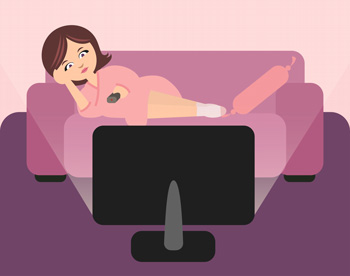By Melanie Medina
Originally appeared in Live Happy, September 30, 2017
THE DISEASE TAUGHT ME TO EMBRACE WHAT I CANNOT CHANGE.
I never planned to write about breast cancer—partly because I told myself it wasn’t that big of a deal, but mostly I didn’t want to be a pink-ribboned poster girl for the disease, trotting out my story and cheapening it with every retelling.
Buck up and deal with it, I told myself. Get the surgery. Take the chemo. What else was I going to do? If I wanted to live to see my 11-month-old son grow out of his baby bed, and watch my 3-year-old daughter start kindergarten, my path was clear. Whatever pain I might have after surgery, however sick I felt after chemo, I would get through it.
REALITY BITES
I recently heard an interview with a veteran Marine who talked about a motto that’s often used in the military: Embrace the suck. I’m not in the military, but I know what she was talking about. Hearing this phrase was the first time I had words to nail down exactly how I got through breast cancer.
Deep down inside, I knew this wasn’t the flu. The fact is, women die from breast cancer every single day—even in 2017. Doctors staged my cancer at 2b. Had it been stage 4, the statistics say I probably wouldn’t be here writing about it.
So I embraced the suck, because it did suck, and there was no use pretending otherwise. I couldn’t Pollyanna my way through it. I had no other options beyond accepting my reality and reacting to each minute as it unfolded.
If anything could be construed as “positivity,” I suppose it was my acceptance of the situation. For the 33 years until my diagnosis, I’d been living in a universe where everything just worked out.
Then I blinked.
And when I opened my eyes, I realized that I’d actually been in a parallel universe my whole life. One where I had a BRCA2 gene mutation that meant when some cells in my right breast started growing out of control, this mutated gene couldn’t go in and stop the nonsense like a healthy BRCA2 gene would do. When I accepted this universe, life with cancer was manageable. It was a kind of suck that I had to embrace.
FINDING THE GOODNESS
For example, I embraced the distressing news from my aunt Margie, who told me that my grandmother wasn’t the only one in our family who’d had breast cancer. My grandmother’s sister had died of breast cancer at age 35. Had Margie not told me this, I never would’ve started doing self-exams in the shower. (Lesson: Know your family history and check your breasts.)
I embraced the fact that it was our neighbor and friend Miss Beth who had to read The Monster at the End of This Book to my curly haired daughter when I couldn’t.
My husband and I embraced Miss Beth’s husband, Mike, when he brought his homemade, Mickey Mouse-shaped pancakes to our kids one Saturday morning.
I embraced my mother for staying with me when, after my nine-hour bilateral mastectomy, my plastic surgeon had to wheel me back into the operating room to take care of a hematoma that had developed. I can’t imagine what a mother feels like after everyone else goes home for the night, and her daughter has to go back into surgery.
I embraced my stepmother for doing my family’s laundry, and my dad for being a good sport and dancing when my daughter commanded him to, and for helping my husband get two tiny kids out of the bathtub because I couldn’t.

I embraced TLC for creating the reality show My Big Fat Gypsy Wedding so that I had something to binge-watch while trying to ignore the nausea from chemo.
I embraced my husband for his humor, and his guidance in helping me choose the right implants for my reconstruction. And for going with me to every single infusion, even though I told him he didn’t have to.
I embraced my co-workers who taped three-dozen tiny pink ribbons on the walls of our conference room—and left them there until I was done with my treatments.
LOOKING FOR SILVER LININGS
I embraced modern medicine. Despite the nausea and utter disgust I felt after each round of chemo, I still thanked God that these medications (and some pretty powerful antiemetics) exist.
I embraced the fact that, early in my diagnosis, we learned that a gene mutation runs on my mother’s side of the family. This explained my great-aunt’s premature death, and the fact that my own grandmother was diagnosed with breast cancer not just once, but twice. Knowing this mutation runs in our family taught us all to be more proactive in taking care of our health.
And today I embrace the fact that I can sit here and write about cancer. Because you know what? It was a big deal. And because not everyone’s fortunate enough to live through it.
And because writing about my own unique perspective—one where the patient doesn’t wear a pink tutu in the O.R. or hang gaudy pink metallic wreaths on her door but instead finds her own begrudging path through this thing—might be helpful after all. Maybe as much for me as for anyone reading this.

